La tragedia: Opera House and BP split
 JAMES SILVER
JAMES SILVER
OIL giant BP has ended its more than three-decade-long association with the Royal Opera House after a barrage of activist pressure.

VOLT FROM THE BLUE
NICHOLAS EARL AND STAFFHOPES for a thriving UK electric vehicle industry received an unexpected spark last night after an 11th hour Aussie bid for the recently collapsed Britishvolt.
The once-feted battery start-up, which had planned to build a lithium-ion battery plant in the north east, fell into administration last week.
But Recharge Industries, looking to build a similar plant just outside of
make geopolitical sense amid ongoing concerns over the use of Chinese kit in future technologies.
“Strengthening our friends in the UK, especially when most others are kicking them when they’re down, is in our interest and definitely in the spirit of (Australia-UK-US security pact) Aukus,” he told the Australian Financial Review.
Recharge sits under New York
considering a move for Britishvolt, with widespread media reports that Indian giant Tata could also be circling.
While ministers are not directly involved in the administration process, which is being undertaken by EY, the rescue of Britishvolt would be seen as a boon for the UK manufacturing sector at large.
Last night business minister Nusrat
Ghani said that “any credible options” would be taken seriously.
Britishvolt’s administration in part came about because of a refusal by the UK government to devote taxpayer cash to the project until it had hit specific milestones related to construction and private sector financial commitments –which it failed to do.
Production of lithium-ion batteries in the UK is considered a vital part of any future electric vehicle industry in the UK.




BP had previously sponsored outreach programmes for the Opera House, including the BP Big Screens initiative which showed opera and ballet in Trafalgar Square.
An activist group calling itself ‘Culture Unstained’ welcomed the move, describing BP as a “climate-wrecking business” that has no business in the arts world.
BP is planning to invest £1bn in electric vehicle charging in the UK in the next 10 years and is developing three UK offshore wind projects which would power over six million homes.
BP said they were “proud” to have supported the Opera House. They aren’t the first to have been attacked by activists for sponsorship of the Arts, with Shell being forced to end a more than decade-long partnership with the National Gallery.
Spoons boss blames the taxman as he prepares to offload a host of London pubs
PUBS in Holborn, Islington and Battersea are on the block as Wetherspoon’s founder Tim Martin looks to rightsize his cheap-andcheerful empire.

Martin slammed the government in a typically colourful trading
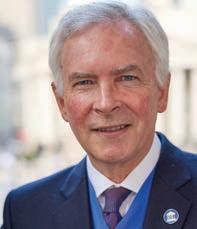
update, complaining that the “vast disparity” in the treatment of pubs and supermarkets was encouraging Brits to swig on the sofa rather than head down to the local.
“Supermarkets pay zero VAT in respect of food sales, whereas pubs and restaurants pay 20 per cent,” he said yesterday.
“This tax benefit allows supermarkets to subsidise the selling price of beer.”
The Norwich-born entrepreneur however said he was “cautiously optimistic” about the year to come despite the combined headwinds of a cost of


living crisis and significantly higher energy bills. Sales were still around 0.7 per cent down on prepandemic levels, he said.
Rail strikes also had a “negative” effect, Martin told the news agency Reuters.
The firm is trying to sell around 35 more pubs on top of the 10 it has already offloaded in recent months.
“Unless the industry campaigns strongly for equality, it will inevitably shrink... which will not help high streets, tourism, the economy overall, or the ancient institution of the pub,” he added.
THE KLEIN-MAN IN THE KNOW THE COLUMN THAT GETS THE SQUARE
AUSSIE FIRM MOVES FOR BRITISHVOLT AS HOPES FOR RESCUE OF COLLAPSED FIRM INCREASE
STANDING UP FOR THE CITY
Why the demise of CDs signals the green genius of free markets
ABOOK lands on the desk at City A.M. towers: In Defence of Capitalism. A brave title in today’s climate, regrettably, and at points the arguments are even braver still –not least when the German author Rainer Zitelmann, an economist, uses his music collection as an example of how markets might well save us all. To listen to many on the yappy, shouty side of the anti-capitalist argument, markets have turned
us all into voracious consumers, gradually eating away at the planet’s resources. Zitelmann proposes a different argument: that innovation driven by capitalism is going to result in the use of fewer, not more resources. The economist’s large
record collection which used to take up several shelves gradually turned into CDs, which for most of the public has in turn been turned into digital files which take up only a sliver of a server. This anecdote is backed up by data –a study of the US economy in 2020 suggested that despite continued economic growth, in that particular advanced economy only six of seventy-two commodities have not yet reached the point of maximum
consumption. This welcome development, he reckons, is “due to the laws of much-maligned capitalism: companies are constantly looking for new ways to produce more efficiently”. That they do this for profit, usually, does not take away from the external benefits to the planet.
When Extinction Rebellion liven up the City with a protest or three, they are perhaps beating down the wrong doors –indeed they may have more common
cause than they think. On everything from shrinking the size of a German economist’s record collection to financing the green energy revolution or developing new, profitable ways to build electric cars, the City will no doubt be more help than hindrance. And, as Zitelmann’s book makes very clear, the workings of the invisible hand will almost certainly be more effective than the dead hand of state interference and regulation.
WHAT
THE GUARDIAN
THE CITY VIEW US JOINS GERMANY IN SENDING TANKS TO UKRAINE AS BIDEN HAILS EFFORT
Joe Biden has approved sending 31 M1 Abrams tanks to Ukraine, a significant escalation in the US effort to counter Russian aggression as international reluctance to send tanks to the battlefront falls away.
THE TIMES
BRITON ARRESTED IN SPAIN FOR ‘HELPING OLIGARCH HIDE £73M YACHT’
A British man who has been arrested in Spain will be extradited to the US for allegedly helping an oligarch with close ties to President Putin to evade sanctions. His Russian-Swiss co-accused, Vladislav Osipov, remains at large.
FINANCIAL TIMES

TRUSS JOINS TORY RIGHTWING CLAMOUR FOR IMMEDIATE TAX CUTS
Recession risks rise as economy goes ‘from bad to worse’
THE RISK of a recession striking the UK is gathering pace, experts warned yesterday, as persistently high inflation and collapsing confidence has resulted in the economy going from “bad to worse”.
Swelling costs squeezing margins are forcing businesses to cut back production, while higher prices are eroding consumers’ incomes. Those two factors are squeezing output, pushing business confidence to minus 23.4 points, the lowest reading since 2009, according to the Institute of Chartered Accountants in England and Wales (ICAEW).
“These findings suggest that the economy went from bad to worse at the end of last year.
“The drop in confidence largely reflects the lethal combination of skyhigh inflation and deteriorating customer demand that many firms are struggling to grapple with.”
Consumer inflation has raced to a 40year high over the last year and is now running at 10.5 per cent.
While it is expected to gradually fall over the course of this year, wages failed to keep pace with price rises in 2022, a dynamic that is expected to continue this year.
The ICAEW’s data indicated that inflationary pressures are still strong. Both input and output are running at record highs.
As a result, households are forecast to wipe out non essential spending to protect their budgets, which, in combination with higher costs, will continue to squeeze businesses’ finances.
The UK economy likely missed a recession at the tail end of last year, with ONS figures revealing GDP climbed 0.2 per cent
in November. As a result, December output would need to drop at least 0.4 per cent for the country to meet the technical two back-toback quarters of contraction recession definition.
Britain has among the lowest rates of business investment in the OECD, a trend that is likely to continue due to the Bank’s nine successive interest rate hikes to 3.5 per cent making it more expensive to
borrow to fund capital projects.
Figures from the Federation of Small Businesses (FSB) paint a similarly bleak picture.

Martin McTague, the FSB’s chair, called on Chancellor Jeremy Hunt to set out more detail on how the government plans to lift the UK economy out of its long growth malaise.
“Clearly, falling consumer spending, inflation, and high energy bills are all taking a toll, and poor results after the golden quarter are particularly disappointing – but this should also be a time to grasp the nettle and be decisive in finding more ways for the economy to grow,” he said.
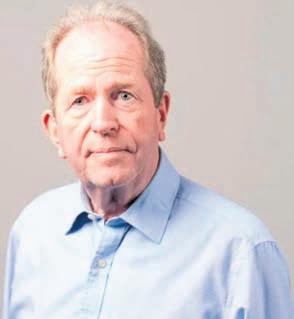
THE OTHER PAPERS SAY THIS MORNINGOF BLESSED MEMORY The reverend canon Maggie McLean lights six hundred candles in the shape of the Star of David, in memory of more than six million Jews murdered FSB chair Martin McTague
SFO’s Osofsky cheers on new anti-fraud law


 LOUIS GOSS
LOUIS GOSS
THE HEAD of the UK’s Serious Fraud Office (SFO) has backed plans for a new ‘failure to prevent’ fraud offence, after government ministers yesterday confirmed the offence would make its way on the statute books.
SFO chief Lisa Osofsky said plans to introduce a failure to prevent offence for fraud has the “potential to transform prosecution” of the crime.
The SFO director’s comments come after security minister Tom Tugendhat yesterday said the UK government “intends to address the need for a failure to prevent offence”.
The government plans to introduce the offence as an amendment to the Economic Crime and Corporate Transparency Bill when it makes it way to the House of Lords.
The bill, which is

currently going through parliament, is set to overhaul Companies House with a view to boosting transparency around UK businesses and corporate entities.

Osofsky, who is set to step down in August, noted the “failure to prevent bribery offence was a game changer” after it was first introduced in 2010.
Failure to prevent offences make companies liable for incidents of crime involving the firm’s staff if they fail to demonstrate that they had adequate systems in place to prevent such wrongdoing.










Susan Hawley, executive director of Spotlight on Corruption, said the move was welcome news, but warned “the devil will be in the detail of what amendment the government brings forward”.
Serious Fraud Office chief Lisa Osofsky
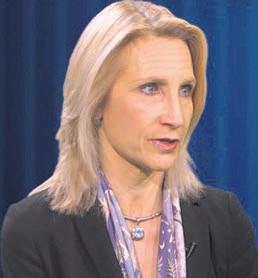
The City’s historic Tower lifeboat rescue station has been moved for the last time, after 16 years of operation saving hundreds of lives. The lifeboat team, under the RNLI banner, has saved 355 lives along the Thames’ 16 miles since 2002.

Transpennine Express at risk of losing its contract


CITY A.M. REPORTER
PRIME Minister Rishi Sunak has warned that Transpennine Express (TPE) is at risk of losing its contract in the coming months if it continues to cancel a high number of services. Sunak said the northern rail operator’s level of service was “unacceptable” and said that discussions about whether to renew

Former Janus Henderson analyst charged in £1.5m insider trading case
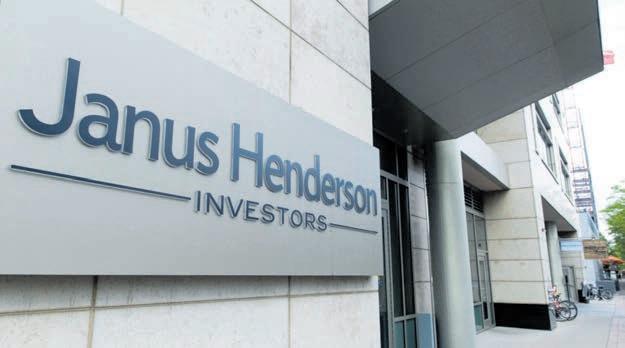 LOUIS GOSS
LOUIS GOSS

THE UK’s financial watchdog has launched criminal proceedings against five individuals over claims they used insider information from an analyst at a top asset manager to illegally generate profits of £1.5m.
The Financial Conduct Authority (FCA) claims Redinel Korfuzi, a former analyst at asset manager
Janus Henderson, and his associates allegedly used confidential information from Korfuzi to make insider trades, generating profits of approximately £1.5m.
Kofuzi’s associates used a network of 49 companies to profit on the insider information by trading on Contracts for Difference derivative products, the FCA said in a statement.
All five individuals were also

charged with money laundering offences.
All of the individuals involved in the case have indicated not guilty pleas. The case is set to appear at Southwark Crown Court on 22 February.
The FCA said Janus Henderson had fully cooperated with its investigation. City A.M. approached Janus Henderson for comment.
TPE’s contract have taken place, according to a report by the Financial Times.
“If ministers conclude the operator cannot be turned around, then other decisions may be made,” he said.
The news comes after rail minister Huw Merriman told members of the Commons’ transport select committee last week that he needed to make a decision about whether to renew
Avanti’s contract soon, over its poor performance.









Avanti West Coast was ranked the country’s worst train operator when it comes to cancellations, according to data published by the Office of Rail and Road this week.
UK-listed transport company First Group, which operates both companies, was contacted by City A.M. for comment.

Mining company Polymetal sees shares dive as it considers UK exit
EARLSHARES in Polymetal International nosedived 20 per cent on the London Stock Exchange yesterday afternoon, following the gold and silver miner’s confirmation it is weighing up a UK exit.
The company confirmed it is considering moving its parent company’s domicile and primary
listing, currently in Jersey and London respectively, to “Russiafriendly” Kazakhstan.
It believed the move “could unblock the ability to execute further corporate actions” following a review process it began last September.
Polymetal said: “As previously announced, the company has continued to evaluate all available options to modify its asset holding
structure in order to maximise shareholder value.”
The miner carries out exploration across six regions of Russia, So far, it has not been directly hit with Western sanctions.
However, Polymetal has suffered from the impact of sanctions as Western investors, bankers, and shippers have reduced their dealings with Russian companies.
Tullow Oil faces hefty £243m tax bill in Ghana after robust results
NICHOLAS EARLTULLOW Oil faces a hefty £243m ($300m) tax bill in Ghana – home to the fossil fuel producer’s flagship fields.
Tullow argued the tax assessments from Ghana, which is pushing the company to pay further tax on historical trading, were “without merit” and said it was in talks with the country.
The oil producer revealed the chunky tax bill in its latest robust trading update ahead of its 2022 full year
results in March.
In its performance review of 2022, Tullow reported figures ahead of guidance, with revenues of £1.38bn ($1.7bn) and free cash flow of $469m.
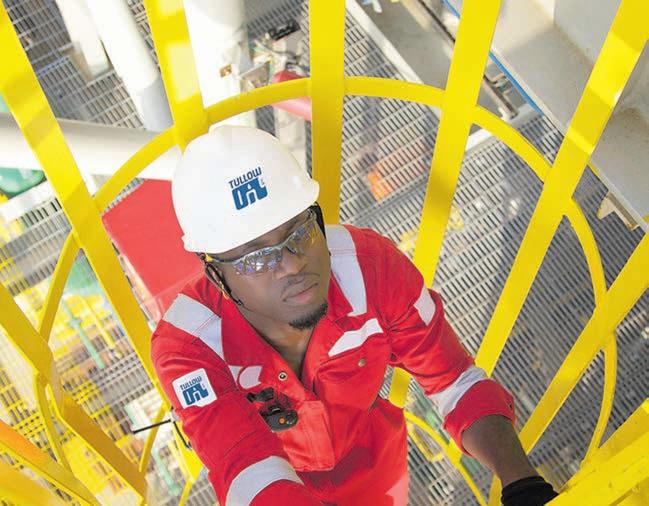
Looking ahead to this year, Tullow expects to produce between 58,000 and 64,000 bpd, broadly in line with last year. The company is now presenting a guide of $700-$800m in free cash flow for the 2024-2025 period – if an oil price of $80 a barrel is realised.
Shares closed up 5.89 per cent.
Windfall tax no silver bullet for Treasury coffers
NICHOLAS EARL
THE NEW levy on North Sea oil and gas operators – dubbed the ‘windfall tax’ –failed to generate the government’s expected takings last month, confirmed the UK’s spending watchdog.
The Office for Budget Responsibility yesterday revealed the Energy Profits Levy (EPL) failed to provide the Treasury with its hoped-for windfall.
Cash receipts for December were a whopping £600m below expectations –equating to a 24.5 per cent dip on government forecasts.
This was the first instalment of EPL payments on 2022 profits, with the second and final instalment due in January.
The OBR suggests the shortfall could be a timing effect between both months, and that it could also reflect the volatility in oil and gas prices – hampering the windfall tax’s takings.
Gas prices dropped sharply in December from £3.50 per therm at the start of the month to £1.86 per therm by the end of the year, according to end of day prices on the UK benchmark.
Costs have since fallen from £1.86 per therm to £1.47 per therm, suggesting a
further slide in revenue takings is on the way.
Chancellor Jeremy Hunt hiked the windfall tax, which was first introduced in May, at the Autumn Statement last November.
He raised the EPL from 25 to 35 per cent and extended the levy for three years from 2025 to 2028.
This is on top of the 40 per cent special corporation tax rate North Sea oil and gas operators already pay and takes overall tax rates on profits for domestic producers to 75 per cent.
He also introduced the Electricity Generator Levy, an effective 45 per cent windfall tax on legacy renewable producers.
Both taxes are forecast to raise £55bn, which will be funnelled towards relief for households and businesses grappling with record energy bills.
The North Sea Transition Authority has revealed a robust licensing round, with over 100 bids for licenses on potential exploration and development sites across the North Sea.
However, major players such as Harbour Energy opted to sit out the licensing round and have confirmed plans for a raft of job cuts.
Easyjet is flying high with strong profits expected
ILARIA GRASSO MACOLAEASYJET expects to deliver a full-year profit after shrinking its quarterly losses by 37 per cent, the company said yesterday, as chief exec Johan Lundgren remained positive about the airline’s preparedness to deal with higher passenger levels this summer.



The low-cost carrier announced yesterday that its losses before tax in the three months ended 31 December fell to £133m after passenger levels grew 47 per cent to 17.5m.


Meanwhile group revenue surged 83 per cent to £1.5bn, with revenue per seat going up 36 per cent to £68.47.
Shares surged almost 10 per cent on the news yesterday.










“We have seen strong and sustained demand for travel over the first quarter, carrying almost 50 per cent more customers compared with last year,” Lundgren said.
“This strong booking performance, aided by the airline’s step changed rev-































































enue capability, has driven an £80m year-on-year boost in the first quarter with continued momentum as customers prioritise spending on holidays for the year ahead.”



Easter bookings, Easyjet said, are 24 per cent higher compared to 2019 levels, while summer bookings are at 60 per cent already, as the airline expects to reach pre-pandemic capacity by September.






Lundgren told journalists he was feeling confident about the wider network’s ability to deal with higher passenger levels and avoid a repetition of last summer’s travel chaos.
Easyjet was one of the airlines that was hit the most by last summer’s travel chaos, when a combination of booming travel demand and staff shortages led to severe delays at some of Europe’s biggest hubs.
“There will be more flights this summer than it was last summer, probably between 10 to 15 per cent more,” the chief executive said.

Boeing posts positive free cash flow despite losses
 ILARIA GRASSO MACOLA
ILARIA GRASSO MACOLA
BOEING has posted a positive free cash flow for the first time since 2018 despite higher net losses.
The US plane maker yesterday reported a $2.3bn (£1.9bn) free cash flow for the whole of 2022, up from a loss of $4.4bn the previous year. Meanwhile, free cash flow for the three months ended 31 December
came in at $3.1bn.



Operating cash flow surged too, going up from a loss of $3.4bn to a net positive of $3.5bn, while revenue soared to $66bn .
However, the announcement was weighed down by Boeing increasing its full-year net losses to $5bn due to weaknesses in the defence sector as well as difficulties in the aviation supply chain. It marked the sixth
quarter in a row of losses for the plane maker.

“Not only have we taken big steps to reduce the risks we have faced over the last three years, but importantly we’re well on our way to restoring operational and financial strength,” chief executive David Calhoun told analysts yesterday.
Despite the challenges, Boeing reaffirmed its guidance for 2023.
UK car production falls to lowest level since 1956 but electric cars break record
NEIL LANCEFIELDUK CAR production fell to its lowest level since 1956 last year as output was hit by global shortages of semiconductor chips, figures show.
A total of 775,014 cars were built in 2022, down 9.8 per cent from the 859,575 made during the previous year, the Society of Motor Manufacturers and Traders (SMMT) said.

December rounded off a volatile 12 months, with output down 17.9 per cent year on year, following growth in October and November. The annual total for 2022 was 40.5 per cent down on pre-coronavirus levels in 2019.
Volumes for the UK last year were up 9.4 per cent compared with 2021, but this failed to offset a 14 per cent decline in exports.
Record levels of electrified vehicles
were produced, with almost a third of all cars made fully electric or hybrid.


The SMMT cited the global shortage of semiconductor chips as limiting car manufacturing.
The industry body’s chief exec, Mike Hawes, said: “These figures reflect just how tough 2022 was for UK car manufacturing, though we still made more electric vehicles than ever before – high-value, cutting-edge models.” PA

Jaguar springs into profitability at last
London drivers hit with largest insurance hikes
LOUIS GOSSMOTORISTS are now paying £100 more for car insurance than last year, according to new research which shows premiums have risen at their sharpest rate in six years.
Car insurance premiums have increased 19 per cent over the past 12 months, meaning motorists now pay average sums of £629 to insure their vehicles, Confused.com’s Car Insurance Price Index shows.
The £100 uptick in premiums comes as insurance costs increased for five quarters in a row.




London motorists took the largest hit, with premiums surging 22 per cent to heights of £1,008 per year.
JAGUAR LAND Rover has returned to profitability for the first time in almost two years, as the easing of a long-running chip shortage has fuelled a surge in production volumes.
The British carmaker yesterday announced it was back in the black, which


it hasn’t been since April 2021, thanks to an easing in the chip shortages that have plagued production for over two years leading to a surge in production .
In the three months ended 31 December, the luxury carmaker reported a £265m profit, up from last year’s £9m loss, while revenues soared 28 per cent to £6bn.
Wholesale volumes – or the number of





cars sold to dealerships – reached 80,000 units, the highest level since early 2021 and 15 per cent up on last year’s levels. This was driven by a ramp up in the production of the new Range Rover and Range Rover Sport models, two of the group’s three most sought-after models.
“We did significantly improve our deliveries of Range Rover and Range





Jaguar Land Rover’s former chief financial officer, Mardell took over the business in late December after chief executive Thierry Bollore stepped down after more than two years at the helm.
Sky-high inflation along with new regulatory rules banning insurers from charging more to loyal customers have hit insurance companies’ balance sheets.




Tim Rourke, head of pricing at insurance adviser WTW, explained insurers’ efforts to maintain their margins in the face of “supply chain disruption, labour shortages, lack of raw materials and increasing food, fuel and energy prices” will see premiums continue to rise.













Cost of living crisis widens UK wealth gap



 JACK BARNETT
JACK BARNETT
THE DISPARITY between Britain’s richest and Britain’s poorest earners has grown as a result of the cost of living crisis and a freezing in the income tax threshold, figures have revealed.
The richest Brits have managed to increase their household disposable income by just over £1,000 in the last year, while the poorest are on average £600 worse off, according to the Office for National Statistics (ONS).
Disposable income among the poorest fifth of UK households tumbled nearly four per cent over the last year to £14,500, according to the Office for National Statistics (ONS).

Meanwhile, the wealthiest fifth have trousered a 1.6 per cent increase in their pay, with the average salary of those in the top bracket coming in at £66,000 a year.
The figures illustrate how the cost of
PMQs: Nadhim Zahawi? Don’t know the guy
SKETCH
Sascha O’Sullivan

As the saying almost goes, the first person to bring up Jeremy Corbyn loses the argument.
living crisis has disproportionately impacted the least well off in Britain, with the richest now more than £51,000 wealthier than the poorest.
A reduction in benefits last year cut incomes at the lower end of the distribution by nearly two per cent.
Income tax freezes and other hikes also caught the poorest, ratcheting up the blow from cutting state payouts.
Businesses have also cut wages for the least well paid staff while handing out bumper rises to the top earners.
“Wages and salaries increased by 3.2 per cent across all households, however, the poorest fifth of people saw a 7.5 per cent decrease, while the richest fifth saw a 7.8 per cent increase,” the ONS said.
Laura Suter, head of personal finance at broker AJ Bell, said: “The poorest fifth of the UK was hit by two factors: their wages failing to keep up with inflation and benefits falling in real terms.”



It’s how you know Rishi Sunak is riled in Prime Minister’s Questions, when he has little to fall back on other than the man who led the Labour Party now more than three years ago.
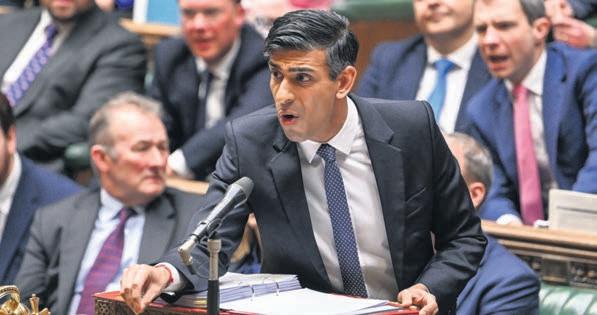
Though, in fairness, he does have a point: at least Sunak eventually quit Boris Johnson’s cabinet, while the Labour leader haunted Corbyn’s frontbenches long after it became clear there were grave concerns about antisemitism.
But this is old news, and like two school friends bitterly disagreeing on who was actually more popular, it’s intensely boring for everyone else.
Keir Starmer knew this and figured hey, what the hell, I’ve tried going after this guy for being at the helm of broken public services, I’m going to go after his height.
While he didn’t quite squawk “you’re too puny for this job” at the pint-sized premier, he certainly alluded to it as he demanded to know if “the job (of prime minister) is simply too big for him?” Cheap, but good, and filled our thirst for blood.
Really this PMQs was part of the long game for Keir Starmer: can he paint a picture of a country so broken by this tiny man leading the Conservative Party that he is a shoo-in for the next election.
The height thing was just for fun.
So will an extra inch make him more prime ministerial?
Probably not.
Starmer, perhaps alive to this, started with a sombre tone following the murder of Zara Aleena, murdered by a man wrongly assessed by the Probation Service to be of “medium risk” to others.
Sunak’s retort of toughening sentencing laws and accountability at the Probation Service will carry little water after weeks of scandals at the Metropolitan Police. Next up, was a Sunak PMQs bingo line,
after Starmer started in on Nadhim Zahawi: “I don’t want to prejudge the outcome of the inquiry.”
But Sunak didn’t know anything about tax dodging, he swore. “The issues in question occurred before I was prime minister,” Sunak told the Commons.
With the nous expected of the former director of public prosecution, Starmer recognised a little of himself in Sunak: “Well Mr Speaker, he avoided the question”.
“I know he reads from his prepared sheets, but he should listen to what I said,” Sunak came back, with a cute quip, “I believe in proper due process.”
In a similar spirit, Starmer will be waiting for next week, this was just the amusebouche to a PMQs on 1 February, when half the country is on strike.
Ad spending on Twitter plummets as companies desert Musk’s platform
AKRITI SHARMA AND SHEILA DANGADVERTISING spend on Twitter dropped by 71 per cent in December, data from an advertising research firm showed, as top advertisers slashed their spending on the social-media platform after Elon Musk’s takeover.
The recent data by Standard Media Index (SMI) comes as Twitter is moving to reverse the advertiser exodus.

It has introduced a slew of initiatives to win back advertisers, offering some free ads, lifting a ban on political advertising and allowing companies greater control over the positioning of their ads.
According to the SMI data, ad spending
on Twitter in November fell 55 per cent from last year despite these months traditionally being a time of higher ad spending.
Twitter did not immediately respond to a Reuters request for comment.
Most of the companies
Twitter has been fighting to reverse its ad decline since Musk took over
had stopped spending in November, estimates by another research firm Pathmatics showed, the same month that Musk restored suspended accounts.
In an event on Twitter Spaces, Musk said that he understands if advertisers “want to give it a minute”.
Reuters
Microsoft applications hit by worldwide user outage
JACK MENDELMICROSOFT is investigating an outage of Teams, Outlook, Microsoft 365 and XBox Live after thousands of users worldwide were yesterday unable to use the platforms.
The service status monitoring website Downdetector reported that
Gambling firm Intouch Games fined over £6m
AZANIA PATELINTOUCH Games has been fined £6.1m for social responsibility and money laundering failings by the Gambling Commission.
The gambling firm, which operates 11 websites, was charged over not having appropriate controls in place and not sufficiently implementing the regulator’s money laundering and terrorist financing risk guidance.
Shareholders block Fox and News Corp reunion
RUPERT Murdoch has abandoned an attempt to reunite Fox and News Corp after shareholders expressed their lack of confidence in the merger.
An announcement by News Corp yesterday said Murdoch had retracted his proposal to “explore a potential combination of News Corp and Fox Corporation” in a letter to Fox and News Corp.
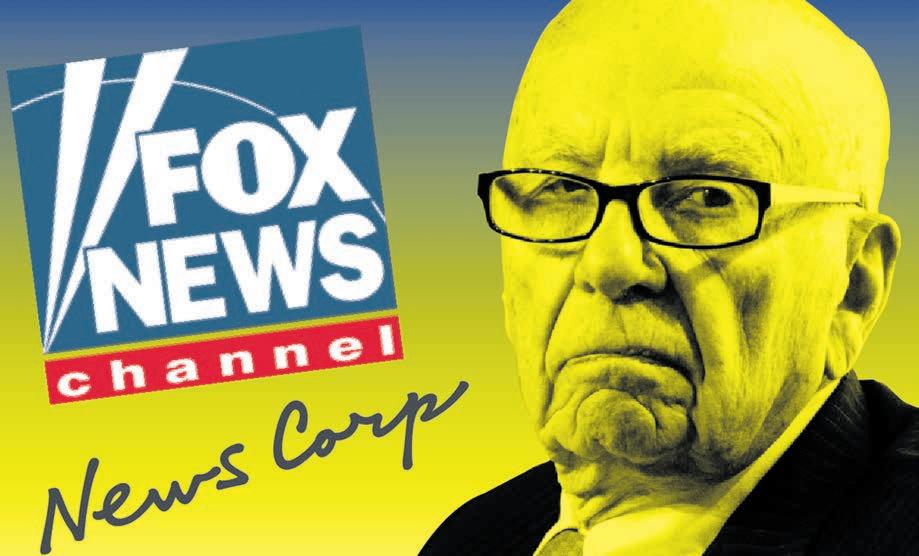
The billionaire media tycoon and his son Lachlan Murdoch said the deal was “not optimal” for shareholders of the two entertainment and news companies.
Large investors like Vanguard and Blackrock were concerned that the
share value of both Fox and News Corp would falter were they to be combined.
“Murdoch’s ambition to stitch back together his empire ran into opposition from shareholders as they believed a combined company would not realise the full value of the assets,” Hargreaves Lansdown analyst Susannah Streeter said.
“As stand-alone television and newspaper entities they are considered to have more value on the stock market, despite the synergies which Mr Murdoch clearly reckoned they could have achieved and the opportunity to create a bigger platform with more leverage for acquisitions.”
Last October, Murdoch initiated a special committee to explore the potential merger of Fox and News Corp, which his family controls roughly 40 per cent of.
However, since those cards are off the table, the special committee has been dissolved. According to sources close to Reuters, discussions between the special committee never led to an offer due to the rebuttal from investors.
Vincent DeAugustino, portfolio manager for T Rowe Price Mid-Cap Value Fund, told City A.M.: “We are thankful for the Special Committees’ careful consideration of a potential recombination of News Corp and Fox Corp.”
thousands of users had reported problems accessing Microsoft services yesterday morning.

Services were recovered in the afternoon, with Microsoft ruling out a cyberattack as a potential cause in a statement to the BBC. The firm said the issue had been caused by a change to its ‘Wide Area Network’.
This is not the first time Intouch games has been fined. In 2019 it paid a £2.2m settlement for failures and in 2021, it received a £3.4m fine and warning for further failures.
Kay Roberts, executive director of operations at the Gambling Commission, said the fine showed how the body “will take escalating enforcement action where failures are repeated and all licensees should be acutely aware of this”.
City of London update
City f irms: ge t access t o the right t alent A
new programme is offering City firms access to qualified, motivated and productive talent from across Central London.
The scheme, run by the City Corporation and called ‘Connecting Communities: Bridge to Success’, works with local people aged 18+ helping them upskill and improve their confidence and life chances through employability.
A team of experienced advisers will ensure that everyone put forward has the right qualifications and attitudes to meet your workforce needs.
Funded by the European Social Fund,
Connecting Communities is an education, training and employment programme supporting thousands of London’s adults into education, training, work and self-employment.
Email bridgetosuccess@ cityoflondon.gov.uk or call 020 3834 7507.

Beec h Stree t : have your say
POLLUTION-busting
24/7 ‘zero-
Beech Street was closed to petrol and diesel vehicles in March 2020, in an 18month experiment aimed at slashing levels of harmful nitrogen dioxide.

Now, the City Corporation is consulting on proposals to ban polluting vehicles from the street permanently, except for
deliveries, access to car parks and forecourts and rubbish collection.
Take part in the consultation at www.cityoflondon.gov.uk/ beechstreet
News, info and of fer s at www.cityof london.gov.uk/eshot

Cold comfort for Aviva as icy winter proves very pricey for the company
LOUIS GOSS






AVIVA said last December’s freezing weather meant it had to pay out £50m to policyholders claiming for damage caused by burst pipes and water tanks.
An Aviva spokesperson told City A.M. soaring energy costs had led to more frozen pipes because households were more reluctant to
turn on the heating, leading to more extremes in temperature.
Aviva brushed aside the financial hit and pledged to retain its dividend at current levels as it continues to face pressure from activist investors.
Shares in rival Direct Line collapsed earlier this month after the insurer announced plans to scrap its 2022 dividend after taking a £140m hit from the freezing weather.
A spokesperson for Aviva told City A.M. the £50m hit to Aviva’s insurer’s balance sheet had been negligible, and said the cost of the December freeze was in line with industry averages.
In a presentation outlining its general insurance segment’s financial results, the firm said it expects fullyear weather costs to sit in line with its own long-term averages.
UK to be global leader in fight on greenwashing
CHRIS DORRELLINDUSTRY figures yesterday claimed the UK was set to become a global leader in the fight against so-called greenwashing after the conclusion of a consultation by the financial regulator.
The new rules aim to clamp down on greenwashing, when firms make exaggerated or misleading claims about the environmental credentials of their investment products.
The Financial Conduct Authority (FCA) proposals aim to build “transparency and trust” by introducing labels to help consumers navigate the market of sustainable investment products, in particular by ensuring the name reflects the sustainability profile of the product.
UK Sustainable Investment and Finance Association (UKSIF) – an industry body representing over 300 members with over £19 trillion in assets – said the rules represent an opportunity for the UK to establish “a world-leading regime” which could see the UK “proactively shape other countries’ approaches to disclosures and labelling in the coming years”.
Speaking exclusively to City A.M., chief
executive of UKSIF James Alexander said the conclusion of the consultation marks “an important milestone in advancing the UK’s objective to be a global leader in the fast-evolving sustainable investing market”.
Whereas the equivalent EU regulation – the SFDR – only has two categories of sustainable fund, the UK has three making it more differentiated and offering consumers more choice.
The three labels are sustainable focus, sustainable improvers and, the highest label, sustainable impact.

UKSIF praised the FCA’s stricter regulatory requirements as opposed to the EU’s “arguably looser criteria”.

However, Alexander noted that aspects of the qualifying criteria, particularly in the ‘Improvers’ category, require further discussion.
The label is potentially a “world leader”, Alexander said, as it should establish a more rigorous definition for the bulk of investments which are neither completely green nor non-green.

UKSIF’s “main concern”, however, is the prospect of “indefinite ‘non improving’” funds in this category over the long term.
Quilter assets under management fall by over £10bn amid volatility
 CHRIS DORRELL
CHRIS DORRELL

QUILTER’s assets under management and administration (AuMA) fell by more than £10bn in 2022 as the industry continues to grapple with instability in the global economy.
In 2022, the wealth manager saw AuMA fall to £99.6bn from £111.8bn the year before. Average AuMA for the fourth quarter of 2022 was £98.8bn, below the first half average of £105.3bn.
Net inflows in the quarter equalled
£159m, down from £236m in the third quarter and markedly down from 2021.
Asset managers have faced rising outflows all year as investors look to shield their cash from the wild swings that have rocked markets in the wake of war in Ukraine and soaring inflation.
CEO Steven Levin commented: “Although net flows for 2022 were below the level we want to achieve, we finished the year on a solid note despite the usual seasonal slowdown towards the end of the quarter.”
BREAKING BUSINESS STORIES AND ANALYSIS
Who to save? A dilemma for the political class
BRITISHVOLT? No. British Steel? Yes (multiple times, albeit with conditions). Is there any more invidious task for Grant Shapps’ Whitehall department than picking winners – or at least picking non-losers?
At times, the process appears extraordinarily arbitrary, and certainly with little attachment to value-for-money criteria embedded in ministerial minds. Take the previous, heavily subsidised bailout of British Steel, the cleverly renamed Scunthorpe-based producer that is the UK’s second-largest player in the sector.
Jingye Group’s purchase of the company out of administration in 2020 came with all kinds of taxpayer support in return for assurances about the Chinese acquirer’s commitment to investing in the business. Mitigating circumstances such as the Covid-19 pandemic notwithstanding, little of that funding commitment appears to have been delivered. So what better way to test Jingye’s mettle (forgive the steelmaking pun) than by doling out another £300m of public money to see if it can effect a

Cheque is in
transition to a greener British steel industry. Mr Shapps (and Michael Gove, the levelling up secretary) had a point when they told Jeremy Hunt, the Chancellor, in a recent letter that steel sovereignty remains economically
important. From a pragmatist’s perspective, though, the argument that allowing British Steel to collapse again would crystallise financial liabilities for taxpayers equivalent to three times the scale of the latest rescue
WHO’s the most surprising new entrant to the ranks of Britain’s banking millionaires? This year’s UK results season is still weeks away, but one lucky beneficiary already has his bonus letter. I understand that David Postings, UK Finance’s chief executive, has just been handed the maximum potential bonus of about £500,000
by the banking lobby group’s remuneration committee – adding to his base salary of £500,000. Postings is regarded by members to have done a decent job since taking over during the pandemic, helping the industry navigate the impact of Russian sanctions last year. Undoubtedly, though, it has been less intense than the existential challenges
package is equally relevant.
Tata Steel, by far the biggest steelmaker in Britain, is receiving an identical package of funding, although whether that is sufficient to persuade the Indian parent to give the long-term guarantees that Shapps is looking for – and stick to them –remains unclear.
On the flip side of the investment coin is Britishvolt, the electric battery start-up hailed by ministers as recently as last year as a sign of the government’s prowess at harnessing the industries of the future.

It remains a mystery as to why the company found it such a struggle to attract the private sector capital needed to unlock state support, but anecdotal evidence from inside Britishvolt suggests ministers were right not to offer a blank cheque.
That, though, may be precisely what they are doing in the case of British Steel and Tata Steel, where even medium-term commitments may come to look hopeless in the face of far greater global industrial forces. Shapps and co are likely to be long gone by then – as ever in politics, it will be someone else’s mess to clean up.
which landed in the laps of predecessors Angela Knight and Anthony Browne. His generous package still won’t make Postings the City’s best-paid trade association chief, however. Chris Cummings, chief executive of the Investment Association, collected a pay package worth about £1.1m in 2021, as I reported here last year. Inflation is everywhere these days, it seems.
City IPO market set for a boost


HERE’s one definition of optimism: a partnership aimed at promoting UK retail investor participation in IPOs and other equity and debt-raises. Yet while last year may have been a turgid one for London floats, and the outlook for 2023 is scarcely better, an alliance to be announced today between Primarybid, the pioneering UK fintech, and broker Winterflood Securities is focused on the long-term pipeline by targeting an improvement in the connectivity between the likes of AJ Bell, Hargreaves Lansdown and wealth managers.
Their collaboration will target a reduction in ‘frictional barriers’ that exist in retail capital-raising infrastructure, by making the process increasingly digital and potentially giving access to IPOs to nearly £300bn of
uninvested cash ISA funds.
This would tap into one of the key themes of Freshfields lawyer Mark Austin’s secondary capital-raising review last year, which recommended that retail investors should not face exclusion from public company fundraisings. Separately, the financial ceiling on retail investor participation in such capital raises is poised to be eliminated this year through the Financial Services and Markets Bill.
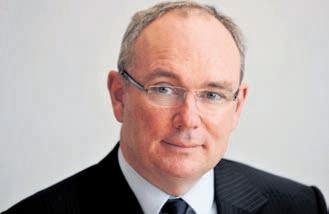
None of this detracts from the fact that so many recent UK floats have performed dismally for investors. Regardless, arcane technology has no place in 21st century capital markets.
“Primarybid has the leading trackrecord in delivering retail access to IPOs and secondary fundraisings, and Winterflood has a 34-year history of
developing innovative solutions to allow retail investors access to secondary market liquidity,” Alex Skrine, director and head of electronic trading at Winterflood, said. “This endeavour brings together two leading market infrastructure providers with an ambition to digitise retail investor access to capital markets and ensure investors are treated fairly.”
“The future is clear: regulatory changes in both the UK and abroad mean that retail investors will play a more meaningful role in the public markets,” Anand Sambasivan, Primarybid chief executive, said. “But the ambitions of UK policymakers will only be realised if the underlying plumbing that broadcasts deals, captures retail demand and delivers allocations is upgraded.”
the Postings: Banking boss enjoys a healthy bonus






MILE AND ME
WHAT WAS YOUR FIRST JOB?
At the Royal Dublin Show, guiding people to their seats. An elderly lady gave me a five pound tip, which was a lot of money in those days!
FIRST JOB IN FINANCE?
I got a job in the early 1980s at the Morgan Guaranty Trust of New York –and I was based in Manhattan on their graduate scheme. It was effectively the core finance parts of an MBA, and I loved it.
WHEN DID YOU KNOW THE CITY WAS THE PLACE FOR YOU?
Pretty much as soon as I got back from that time in New York. I loved it straight away.
WHAT’S THE ONE THING YOU LOVE ABOUT THE CITY OF LONDON?

One thing that stands out is the architecture. We’re celebrating 300 years of Sir Christopher Wren’s death this year and his churches in particular really bind together the City. We’re surrounded by finance all day but the architecture is a reminder of the spiritual side of life, too.

AND ONE THING YOU’D CHANGE?
Getting around is still a challenge! So maybe we could move deliveries to out of hours to make sure we can move through the City a little quicker.
WHAT’S ONE THING THAT HAS SURPRISED YOU ABOUT BECOMING LORD MAYOR?
Perhaps it’s the fact that when you extend an invitation to somebody, the answer is invariably yes. This role grants extraordinary access and a convening power which is vital for
We dig into the memory bank of London’s great and good: this week, the Lord Mayor of the City of London Nicholas Lyons
RESTAURANT FOR LUNCH –WHERE ARE YOU GOING?
I live my life between the Guildhall and the Mansion House and my favourite on that stretch is the French restaurant Cabotte on Gresham Street.
AND FOR A QUICK DRINK AFTER WORK?
I don’t get to go to the pub very often these days! But certainly in my younger years I did like the Old Dr. Butler’s Head on Masons Avenue.

WHO IS THE CITY FIGURE YOU MOST ADMIRE?

In the past, I think it’s the former HSBC boss Willie Purves. He was a powerful, honest Scotsman and he really managed to turn HSBC into a truly global bank, guiding it through the acquisition of the Midland Bank. In today’s world I’d say Sir Nigel Wilson at Legal and General.

WHERE’S HOME DURING THE WEEK?
Well, it’s now here at the Mansion House!
AND WHERE MIGHT WE FIND YOU AT THE WEEKEND?
Home is really north Norfolk, so I’ll be there walking our three English spaniels.
driving forward the City’s agenda.
AND HOW DO YOU FEEL ABOUT THE POMP AND CEREMONY?
There are moments when you look down at the occasionally strange
outfits –which I have to wear quite a lot –but really it’s about being a continuum of history. I’m the 694th Lord Mayor, the Rector of City University, the Admiral of the Port of London and no doubt other titles I
haven’t
YOU’RE PICKING THE
YOU’VE GOT A WEEK OFF –WHERE ARE YOU GOING AND WHO ARE YOU GOING WITH?
We’ll head to the West Indies –to the island of Nevis, and the Montpellier Plantation Hotel. My wife and I have been going there for 35 years. It’s our haven.

A digital pound looks on the cards, despite BoE concern
THE WINDSof fortune appear to be turning in a favourable direction for the prospect of creating a digital pound, despite the best efforts of the Bank of England’s Governor to nip the idea in the bud.
Andrew Bailey, who has been Governor since 2020, recently put the boot in on the notion of a central bank digital currency (CBDC), telling ministers at the Treasury Select Committee that he wasn’t sure there was a need for a CBDC.
"I think it's an open question whether a wholesale digital central bank currency is needed because we've got a wholesale central bank money settlement system with a major upgrade," the central banking stalwart said.

"We have to be very clear what problem we are trying to solve here before we get carried away by the technology and the idea."
The committee’s assembly coincided with a meeting of euro zone finance ministers who agreed to support continued work on a digital euro – something being taken very seriously by the European Central Bank.
However, while Bailey’s deep concerns are being mooted in the corridors of Whitehall, other forces within the Bank of England itself are quietly getting on with the business of ushering in an era of CBDCs.
Over the coming weeks, in tandem with updating its real-time gross settlement system (RTGS), the BoE will launch a public consultation on what the attributes of a digital
pound should be.
On Tuesday, the Bank will also reveal which blockchain company has won the contract to create a wallet for its CBDC experiment. Tenders were invited in early December and saw a total of 20 firms submit applications for the £200,000 five-month project.
It is understood the contract is purely to establish a prototype for
IT’S BEENanother lively week in the crypto markets, with the price of Bitcoin popping its head above $23k for the first time since August. The largest cryptocurrency by total value has also largely managed to sustain that level, changing hands for between $22,500 and $23,000 for the majority of the week. At time of writing on Wednesday afternoon, it’s up more than five per cent over the past seven days to $22,500. Elsewhere, other major cryptocurrencies have also performed well, with the majority seeing small
gains. The price of Ethereum was down five per cent on Wednesday, though it’s still holding strong above $1,500. Bitcoin is still leading the market recovery though, with its market dominance climbing to levels not seen since the middle of last year.
The positive price action is also reinforced by sustained improvements in trading volumes, which have remained elevated throughout the past seven days.
Volumes on the major exchanges are still pushing above $1bn a day outside of
user experience testing, and not a statement of intent from behind the robust doors of Threadneedle Street. What is clear, however, is a definite groundswell of support leaning towards entertaining the idea of a CBDC – a movement described as “an important development” by Julia Demidova, Head of Digital Asset and Product Strategy at FIS Global – a provider of core processors for many
Binance, while Binance’s daily average volume over the past seven days sits above $10bn. While a structural short squeeze ignited the strength, it’s promising to see that the momentum is supported by persistent high spot volume.
So, what’s behind the rise? Given that there doesn’t seem to be any noticeable arrest to the news from FTX, many analysts are crediting the improving inflation outlook. The signs are good that inflation is slowing surprisingly fast, though the US PPI release came in
of the world’s financial institutions.
“Stablecoins are taking off and becoming more mainstream, with increasing institutional support, and will almost certainly change the payments landscape,” she said.
“We could see a system in which we have multiple stablecoins pegged to the pound, co-existing and interoperable with a Central Bank Digital Currency (CBDC).”
LUNO ANNOUNCES SWATHE OF JOB CUTS
LONDON-based cryptocurrency exchange Luno today informed its entire workforce that 35 per cent of the roles within the company are to be axed.
The long-standing firm, with offices across Europe, South East Asia and Africa, is owned by struggling conglomerate DCG (Digital Currency Group).
It is understood around 960 people currently work for Luno, meaning more than 300 roles will be cut.

“2022 has been an incredibly tough year for the broader tech industry and in particular the crypto market,” a company statement said.
“Luno unfortunately hasn’t been immune to this turbulence, which has affected our overall growth and revenue numbers.”
ETHEREUM SMART CONTRACTS PLUMMET
THE number of Ethereum smart contracts has halved since the start of the month.
Three weeks ago, the network was processing around 140,000 smart contracts – a figure which fell to just 10,000 on January 14, but has since risen to 56,300 this week. Due to the contracts using Ethereum’s native Ether token to transact, there is some concern among analysts it may impact the price. Despite a recent lift, the price of ETH yesterday fell by five per cent.
BITFINEX BECOMES FIRST CLIENT FOR TAP GLOBAL
CRYPTO app Tap Global has named the Bitfinex exchange as its first client for its newly-launched ‘cards as a service’ (CAAS) B2B product.
The regulated crypto app, designed to bridge traditional finance and blockchain technology, is using the new product to enable companies like Bitfinex offer customers a prepaid Mastercard to enhance their existing financial offering.
surprisingly low at -0.5 per cent. This marks the first negative market reaction to a deflationary economic release, and it could indicate that the macro sentiment is gradually changing from worrying about inflation to worrying about a potential recession. It’s nice to have something new to worry about at least.
The card, which will be made available to all of Bitfinex’s European users, will be underpinned by Tap’s existing infrastructure and regulatory approvals and will allow Bitfinex account holders to convert their cryptocurrency assets to Euros which they can send to their card to purchase from any of the 37 million worldwide merchants which accept Mastercard.
REMARKABLE GAINS FOR LCX
EXCHANGE coin LCX has been the stand-out performer this week, posting a seven-day rise of around 75 per cent. The Ethereum token, which is used to pay for fees on the LCX exchange, has also notched an impressive 300 per cent upward curve across January.
The LCX token was last night valued at $0.14 with a 24-hour buying volume exceeding 600 per cent at $8.5 million. It reached an all-time high of $0.68 in November 2021.
CITY DASHBOARD
YOUR ONE-STOP SHOP FOR BROKER VIEWS AND MARKET REPORTS



LONDON REPORT BEST OF THE BROKERS

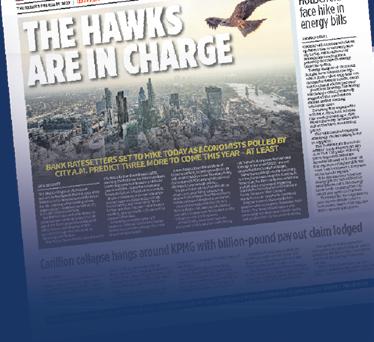







Barclays, HSBC and Easyjet all shine on otherwise poor day
LONDON’s FTSE 100 yesterday gave up morning gains to finish lower before stronger-than-expected retail earnings provided a balm against recession fears.
The capital’s premier index fell 0.22 per cent to 7,740.34 points, while the domestically-focused midcap FTSE 250 index, which is more aligned with the health of the UK economy, slid 0.38 per cent to 19,778.91 points.
Retail and leisure stocks dominated the list of the day’s top risers during early exchanges, with Tesco up 1.07 per cent, Mike Ashley’s Frasers Group jumping 0.79 per cent and B&Q owner Kingfisher climbing 0.53 per cent.
Instead, the FTSE 100 was propped up by Britain’s biggest banks surging on the prospect of another 50 basis point interest rate hike from the Bank of England next Thursday.

HSBC, Barclays, Lloyds and Natwest all finished close to the FTSE 100’s summit, however their advances were not enough to tip the index into the green.

Credit checker Experian tumbled more than three per cent after analysts at Credit Suisse downgraded their outlook for the company.
Online supermarket and middle-class favourite Ocado was also more than four per cent lower, denting a new year rally.

Pub chain and FTSE 250 listed J D Wetherspoon collapsed nearly six per cent despite a glowing set of results.
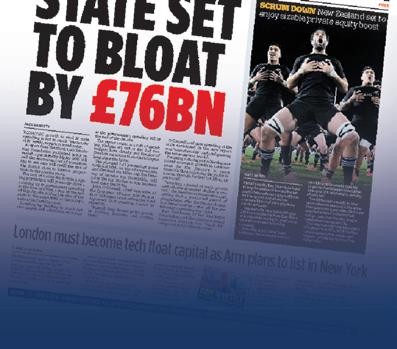
Susannah Streeter, senior investment and market analyst at Hargreaves Lansdown said: “Tills were ringing over Christmas with sales in the last twelve weeks up 17.8 per cent compared to the same period a year ago.”




Despite intense cost of living pressures, short haul airline Easyjet said it is on course to return to profit.

J D Wetherspoon’s “long term recovery potential” means shares in the pub conglomerate are still worth holding onto, Peel Hunt analysts said. They warned, however, that the Watford company’s slower sales and increasing debts could scupper the pub firm’s finances as the analysts noted Wetherspoon’s energy hedging bets end in July.
SUNSHINE STOCK SURGE
Air,


“Easyjet’s sunny disposition helped create a nice tailwind for its fellow airlines IAG, Wizz
TUI and Jet2. Holidays are sacred to Brits and as we drag on another jumper to stop us reaching for that thermostat there will be plenty of people feeling they deserve something to look forward to.”
DANNI HEWSON, AJ BELL
OPINION
EDITED BY SASCHA O’SULLIVANJANUARY is always a tough month in London, but amidst the doom and gloom, there is a nascent and growing sense of another great revival in the capital this year. I’d encourage Londoners to cast misery aside, and take advantage of another London spring, with varied, green shoots of recovery, sprouting up all over our city.
Cold, short days, combined with tight budgets after the excesses of December, can encourage a general feeling of negativity. Costs have been rising faster than incomes, and strikes are spoiling travel plans. Westminster is mired in scandal, and many institutions that define London feel, at best, depleted –from the warring Royal Family and the disgraced Metropolitan Police, to the hard-done-by cultural icons, with budgets cut by the Arts Council, including the English National Opera, the ICA, and the Donmar theatre.
But on the plus side, urban renewals are hitting their stride – like the recently opened Battersea development, where the bars and eateries are full, the shops are now mostly open, and the buzz is tangible. Or the still maturing, modern areas of Coal Drops Yard in King’s Cross, and even the more gradually transforming Canary Wharf –currently aglow during the Winter
Lights festival, E14 is far from the dull corporate desert it once was. Too many Londoners are cocooned, working from home and missing the dynamism of the city. Others are tempted to high-five strangers on the still-new Elizabeth line, delighted by the elegant speed with which its long, clean trains cut through from east to west and back again. Hours have been taken off many commutes and fun nights out, whilst also freeing up space on the traditionally over-crowded carriages of the Central and Jubilee lines.

Immigration, that great provider of momentum to London, is also staging
a renaissance. Bloomberg reported this month that we now have more Italians living in the capital than before the pandemic. Hong Kong’s loss is London’s gain after hundreds of thousands of British visas were granted to people living there, meaning we now also have more Cantonese in town.
Apart from the cultural freshness that incomers bring, Italian and Cantonese cuisines are widely regarded as two of the world’s best, so that can surely only help create a tasty culinary future.
Talking of food, restaurant experts are excited about the new openings for 2023, with evidence pointing to a
Let’s be honest, we might actually save the climate with lab-made meat alternatives
THE CONVERSATION turned to travel during an awkward first date a few years ago. “I refuse to fly because of the environment,” he told me. “A recent trip to Sweden by train only took 24 hours.” I immediately raised an eyebrow: a trip back to visit my family in Australia without a plane would involve the Trans-Siberian railway or the Suez canal. There was no second date.
Many in the environmental movement embrace this kind of puritanical attitude. They think the only righteous personal response to the climate crisis is to give up air travel, never use plastic, turn vegan and cycle everywhere.
The only government response involves taxes and bans, often couched in Orwellian language around “enabling” consumers to take “concrete actions” for the climate.
Some people are very willing to make lifestyle sacrifices. But it’s foolish to presume that this alone will make the real difference.
Matthew LeshLet’s take the case of meat. Livestock farming is responsible for about 15 per cent of human-induced greenhouse gas emissions. It also involves substantial land use, deforestation, habitat and biodiversity loss, pesticides, and pollutants. Not to mention the mistreatment of animals in industrial processes and health and food security risks, including disease and antibiotic resistance.
All of these downsides have been known for a long time – so then, what’s happening with meat consumption? It has quadrupled since the 1960s. It is expected to keep increasing over the coming decades as countries
climb the development ladder. Even here in Britain, only 5 per cent of people identify as vegan or vegetarian. Studies suggest that the intention to reduce meat consumption rarely translates into behaviour change. Meat taxes are condemned for hurting the poor and are deeply unpopular. Even if we feel we should resist our carnivorous urges, we don’t. But perhaps all hope is not lost. Cultivated meat is an alternative protein, produced in vitro using animal cells, that can replicate conventional meat's sensory and nutritional profile. The first cultivated product was approved for sale in Singapore in 2020, while the United States Food and Drug Administration has just done the same.
We are in the foothills of a food revolution that could significantly alleviate the environmental and animal welfare links to livestock farming. But there’s a catch. Red tape risks delaying, if not preventing, this opportunity in the UK and EU. The novel food regulations, retained in UK law after Brexit, embody
the precautionary principle. As a result, it takes an average of 35 months and hundreds of thousands of pounds to get approval; it is unclear what is expected, and an application can be delayed indefinitely. This uncertainty risks sending British innovators away, to other jurisdictions.
There is a long history of new technologies making older ones obsolete.
The motor vehicle replaced the horsedrawn carriage, saving city streets from piling up with - literal - faeces.
Plastic replaced ivory, saving elephants. Petroleum replaced whale oil, saving the species from extinction.
Lab-grown meat could replace livestock farming, saving - or at least playing a part - our environment from such a high percentage of greenhouse gas emissions. It's surely the kind of innovation even people not willing to travel to Scandinavia by rail could get behind.
£ Matthew Lesh is the head of public policy at the Institute of Economic Affairs
thriving dining scene despite the economic headwinds. The two-Michelinstarred Ikoyi relaunched just before Christmas at a new site on The Strand and sold out immediately for two months, despite a £310 per head menu.
HUMO is opening in the next few weeks near Saville Row, bringing smoked food with Japanese and Colombian influences in yet another London innovation. And for an evening of camp Ibiza cabaret debauchery, Lío London will be welcoming audiences from March in the former Café De Paris venue by Piccadilly Circus – itself an iconic site of London resurrection after it was famously bombed out in the Second World War, and then relaunched in the late 1940s.
Hotels are playing their part, too, in London’s ongoing re-birth. The OWO is a new Raffles hotel in Whitehall with 9 restaurant sites helmed by Mauro Colagreco, chef of one-time “best restaurant in the world”, Mirazur. The Mandarin Oriental Mayfair is opening in the spring on Hanover Square, complete with new restaurants by renowned Korean-American chef Akira Back. The Peninsula, in the pocket of Belgravia just by Buckingham Palace, is also preparing for a huge mid-2023 opening.
And, to top it all, today five of London’s football teams are, unusually, in the top 10 of the Premier League.
So, life in London is good in 2023. Put aside any seasonal blues, and begin to plan your adventures in our worldbeating, ever-changing city.
£ Alex Cheatle is chief executive officer and founder of Ten Lifestyle Group



Yes it’s cold and dark, but London will find a way to beat the January bluesAlex
CheatleThe winter light show at Battersea Power Station
ANOTHER DAY, ANOTHER DALLIANCE WITH HMRC
Nadhim Zahawi faced yet another day of questions over his tax affairs, with Keir Starmer demanding to know if he should be allowed to stay in post. The number of Tories calling for him to go has also started to tick upwards
Too many Londoners are cocooned, working from home and missing the city
We can’t forgive China for Tibet
[Re: Breaking up is never easy: Sunak should remain firm on China, 24 Jan]
The view expressing, "China will not change as long as Xi Jinping is in power" is spot on. Apart from the reported human rights abuses in Xinjiang, the crackdown on pro-democracy protests in Hong Kong and its increasingly hostile stance towards Taiwan, China's continued occupation of Tibet is a major blot on its global image. And under Xi Jinping's totalitarian rule, the situation had gone worse in occupied-Tibet, Xinjiang, Hong Kong and even in China, plus the renewed Covid-19 onslaught.
On 23 Jan, Free Tibet and Tibet Watch launched their report titled, "Desecration in Drago County: Destruction of Tibetan religious heritage, arbitrary detentions and torture".
This ground breaking report which was launched at an event in one of the committee rooms in the British Parliament details how in late 2021 residents living in the Drago region in eastern Tibet were for months victimised by the Chinese authorities. They were put under surveillance, detained and tortured, and invaluable religious and cultural heritage were destroyed. A Tibetan monk from that area now living in exile has been quoted in the report as
We might not beat China, but
testifying, "As with other areas in Tibet, the main reason for increasing Chinese repression in Kham Drago is first to eradicate Tibetan identity and Tibetan culture. Secondly, to eliminate those influential Tibetans who are conscious of freedom and rights of Tibetan people and thirdly, to abolish Tibetan language and education centres.”
Britain is one of the countries that has enjoyed friendly relations with Tibet when it was an independent country and with which it also has signed treaties. Therefore it has a moral duty to speak up for Tibet with China from a position of strength. Last year, Prime Minister Sunak rightly declared the end of the so-called golden era of UK-China relations that was born under Cameron's government to attract Chinese investment. Former British Prime Minister Margaret Thatcher in her book, "Statecraft, Strategies for a Changing World", maintains that China's claim over Tibet is dubious on historical grounds and adds that its "systematic extinction of a nation and its culture is unpardonable." The lead that Britain is taking in supporting Ukraine against Putin's war and invasion is commendable.
Tsering TashiSCHOLZ THING Germany approves sending Leopard 2 tanks to Ukraine
After weeks of pressure, Olaf Scholz, the German Chancellor, capitulated and agreed to send tanks to Kyiv.
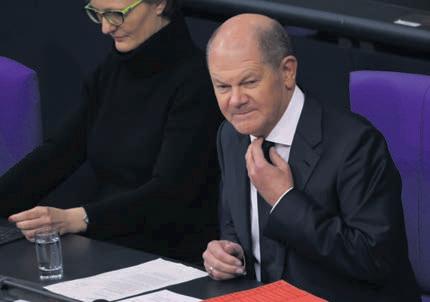
His U-turn came after the Biden administration suggested it was willing to send American weapons to Ukraine.
EXPLAINER-IN-BRIEF: ANOTHER HURDLE FOR A VERY BRITISH BILL OF RIGHTS
Yesterday, the Joint Committee on Human Rights came out and said the Bill of Rights set forth by Dominic Raab shouldn’t be approved in its current form. MPs and peers said it restricts the rights “the government finds inconvenient”, and it would actually make it harder for individuals to defend their rights in court. The committee also pointed out that by scrapping the Human Rights Act, we lose decades of salient case law. The committee’s report concluded
St Magnus House, 3 Lower Thames Street, London, EC3R 6HD Tel: 020 3201 8900
Email: news@cityam.com

to develop offshore wind farms
BRITAIN was once at the forefront of technological innovation and ground-breaking engineering. But what is Britain world class at now?
Tony Danker, the director general of the CBI, has an answer: he believes we’re world class "at being an impossible place" to build basically anything.
He’s not wrong. Extortionate energy bills, unaffordable studio flats in Zone 5, 15 years of sluggish productivity growth – scratch any of the economic challenges facing Britain and you’ll find our broken planning system lurking beneath the surface.
In his first major speech of the year yesterday, Danker identified clean growth as a massive opportunity for the UK. But it's one we're squandering because planning and consent for major projects takes far too long.
It takes up to 13 years to get a new offshore wind farm up and running – yet actually building them takes just a fraction of this time – up to 3 years. Sig-
the bill would only cause more cases to be brought to the European court in Strasbourg and would “damage our international reputation as guardians of human rights”. If the bill makes it into law, it would please the right of the party - it is strongly supported by the Home Secretary. But it is likely to make softer wings, who are conscious of what many lawyers’ associations are saying about it, uneasy.
ELENA SINISCALCOCertified Distribution from 30/5/2022 till 01/07/2022 is 79,855
nificantly more time is spent on getting planning consent for projects, carrying out increasingly lengthy environmental impact assessments, and seeing off potential legal challenges.

There's an incorrect assumption that speeding up the planning process for building new wind turbines or solar farms means trashing environmental protections. In fact, Britain (and England in particular) has become one of the most nature-depleted places in the world under the existing system.
Why not instead divert some of the resources currently being expended on compiling fruitless environmental impact assessments, which regularly stretch to 10,000 plus pages, directly towards funds for nature
restoration projects?
Offshore wind is one area where we are genuinely world class. Last week I met with firms in the Port of Blyth already benefiting from the clean growth opportunity Danker highlighted, designing and manufacturing the kit we need to install massive turbines miles into the North Sea. They’re ready and willing to scale up: quite simply if we speed up deployment of new sources of clean cheap power, they can hire more people to build and sell more.
China built more renewable capacity last year alone than the entire UK grid. With the US’s Inflation Reduction Act set to drive an American renewable energy gold rush and the EU mapping out their rival plan, we can’t afford to be stuck in the slow lane, or enacting self-defeating policies such as the effective ban on new onshore wind farms in England.
We may not be able to outspend our rivals, but we can at least remove the barriers holding back our genuinely
world leading sectors: speed up offshore wind, solar, and nuclear, and unlock the cheapest source of power –onshore wind. This will not only make our energy more affordable, it will create a huge number of goodquality jobs in places that have been crying out for investment for far too long. Places like Blyth, like Teesside, like the North West and the Midlands. Where once financing was the barrier to building clean energy projects, today the City stands ready to deploy its heavyweight financial firepower to make these projects a reality, and make Britain a global centre for green finance.

There is a highly skilled workforce ready to unleash Britain’s clean energy potential, delivering abundant clean power that will cut energy bills across the country – but we need to remove the planning barriers and get Britain building.
Distribution helpline If you have any comments about the distribution of City A.M. please ring 0203 201 8900, or email distribution@cityam.com
Our terms and conditions for external contributors can be viewed at cityam.com/terms-conditions
Printed by Iliffe Print Cambridge Ltd., Winship Road, Milton, Cambridge, CB24 6PP
Editorial Editor Andy Silvester | News Editor Ben Lucas Comment & Features Editor Sascha O’Sullivan£ Sam Richards is chief executive officer of Britain RemadeSam Richards
it shouldn’t take 13 years
Speeding up planning for wind farms doesn’t mean trashing the environment
A
FILMS
EDITED BY STEVE DINNEEN @steve_dinneenDESERVED OSCAR NOD FOR THIS RARE STRUGGLING SPIELBERG DRAMA
FILM
RECOMMENDED THE FABELMANS DIR. STEVEN SPIELBERG BY JAMES LUXFORDABest Picture Oscar nomination this week will be a welcome relief for The Fabelmans, Steven Spielberg’s new family drama. When it debuted in the US last year, it became the Hollywood legend’s worst performing film, and an undeserved flop as audiences stayed away from prestige movies. Will the Oscar bump see a happier ending here?
The film is a fictionalised take on Spielberg’s childhood. The names are different, but the events follow closely his early years as a film obsessed boy in Arizona. As his proxy Sam (Gabriel LaBelle) falls for the Silver Screen, he deals with his family moving cities, as well as the strain between his work-obsessed father (Paul Dano) and artistic mother (Michelle Williams).

Running at around two and a half hours, the 50s-set film takes on many forms. It’s at its best when examining the flaws of his parents, adopting a
darker tone than we’re used to seeing from a Spielberg movie. The characters are damaged, and their difficulties aren’t resolved easily. The scenes dealing with high school are more formulaic, but the Oscar winner never forgets the humanity in the story. Yes, it’s a love letter to cinema, or his ‘hobby’ as Spielberg Sr calls it. However, aside from a delightful end scene with John Ford (David Lynch), it rightly focuses on the people who sparked his creativity.
Dano continues his diverse career with a role that couldn’t be more different to The Riddler. Along with Spielberg and Tony Kushner’s script, he’s at great pains to show a man who is caring but perhaps too emotionally distant from those he loves. Williams, by contrast, is a whirlwind, constantly on the verge of a meltdown. It’s to everyone’s credit that she is never portrayed as cruel or raving, an ugly stereotype of mental illness in cinema. As for Sam/Spielberg himself, LaBelle is superb. Meek without being boring, he captures his reallife inspiration perfectly.
Movies about Hollywood can often be dry and self-serving. The Fabelmans is about family, and the imperfect homes that make us who we are. Spielberg waited until his parents’ passing to make the movie for fear of upsetting them, but it’s safe to say he’s done them proud.
EMPIRE OF LIGHT DIR. SAM MENDES
BY JAMES LUXFORDSam Mendes’ new film Empire of Light is one part of a broader artistic response to the peril cinemas have found themselves in during the pandemic. Steven Spielberg’s love of the big screen is explored in The Fabelmans (see above), and Babylon was another of 2023’s odes to cinema.
 TILL DIR. CHINONYE CHUKWU
BY JAMES LUXFORD
TILL DIR. CHINONYE CHUKWU
BY JAMES LUXFORD
Nearly seventy years on, the murder of Emmett Till stands as one of the most shocking and shameful moments in American history.
In 1955, 14-year-old Till was abducted while visiting family in Mississippi and lynched for a perceived offence to a white woman. His horrifyingly disfigured remains were found, and the resulting images became a symbol of the Civil Rights movement, as well as a wakeup call to America.
Director Chinonye Chukwu, who also masterminded Clemency, could easily have zoomed in on the murder, exploiting its barbarism for dramatic effect. But her story focuses on the people.

Danielle Deadwyler plays Till’s mother, Mamie, who has reservations about her beloved son leaving Chicago, only to have her worst fears realised.
Deadwyler is spectacular, portraying Mamie as a woman twisted in grief but eventually finding the strength to stand in the face of unimaginable hate and demand justice.
Olivia Colman stars as Hilary, the duty manager of a seaside cinema in the early eighties, which has seen better days. She meets Stephen, played by Top Boy’s Micheal Ward, a new hire who is energetic and friendly despite experiencing racism in their small town.

Working with regular collaborator Roger Deakins, Empire of Light is so beautiful it’s almost more enjoyable with the sound off, with lingering shots of the crumbling art deco cinema and its broken screens.
Sadly, this gorgeous aesthetic isn’t matched with a story worth telling. For someone who made their name with urgent, biting stories like American Beauty and Jarhead, it’s strange to see Mendes so content to be humdrum. Hilary’s loneliness and depression are never explored adequately despite Colman’s best efforts, and the racist abuse Stephen suffers at the hands of skinheads is used as a narrative device rather than social commentary.
A collection of fine supporting actors give the story a pulse, from Toby Jones’ curmudgeonly projectionist to Colin Firth as an aloof manager. But Empire of Light feels disjointed, a series of stills unspooled from their reel.
Amidst all the complicated emotions of Oscar season, it’s a nice change of pace to see something as straightforward as Plane, starring Gerard Butler, on the release slate. The all-action Scot plays Brodie Torrance, a pilot in charge of a routine flight that’s forced to crash land on an island near the Philippines.
While Plane is a bit more than Die Hard in the air, director Jean-François Richet (2008’s Mesrine) doesn’t reinvent the wheel. The film unfolds as you would expect, with Butler quickly turning into a killing machine. There are non-descript foreign baddies and a government specialist (Tony Goldwyn) shouting down a phone in a crisis room. It’s a straight-to-streaming action flick with a slightly higher budget, reminiscent of Michael Bay’s guilty pleasure Ambulance from last year.
The dreadful dialogue is somewhat rescued by Butler’s intense delivery. Brodie spends longer discussing the Scotland-England rivalry than he does his dead wife, and growls things like “we’re a stick o’dynamite!” during the elaborate crash sequence. Mike Colter, best known as Marvel’s Luke Cage, offers charismatic support as the ally who Brodie has no choice but to trust as bullets spray and the passengers scream in terror.
Plane does exactly what it says on the boarding pass. Butler is the king of big dumb action, getting the tone just right for those in search of uncomplicated thrills.
WHAT DO THE OSCAR AND BAFTA NOMS MEAN?

Awards season: From accusations of systemic discrimination
of colour
The Oscar nominations for 2023 were revealed at a ceremony in Los Angeles this week, prompting the annual round of criticism of the Academy, which becomes more depressing with each year that passes. Coupled with last week’s BAFTA noms, we ask what the awards season contenders say about movies today.
WHY THE OSCARS ARE ‘BROKEN FOR
BLACK WOMEN’
Critics have been calling out the Oscar nominations for not being diverse enough, saying there are systemic reasons why black people are not being recognised.
Of this year’s nods, all Best Actor nominations are white men, while Michelle Yeoh makes up the only nonwhite nomination for Best Actress.

In terms of black and brown people nominated this year, Rihanna has received her first nod for the song Lift Me Up from Black Panther: Wakanda Forever, and director Daniel Kwan is up for Best Director for Everything Everywhere All At Once. Stephanie Hsu and Ke Huy Quan are nominated for Best Supporting Actress and Best Supporting Actor respectively for Everything Everywhere All At Once.
The film critic Robert Daniels, who writes for the New York Times and Vulture among others, called out the Academy on social media, saying black women have a “systematic disadvantage” when it comes to being recognised for their work.
He said: “What I think many (white) people are missing is that even if you have a great performance and you play the money game, as a black woman you’re still at a systematic disadvantage to a white person who didnt have those advantages. That blows.”
Earlier he had written: “Another year: Halle Berry is still the only black woman who’s won Best Actress.
Selma is still the only film directed by a black woman to be nominated for Best Picture. A black director has never won Best Director; and a black woman has never been nominated.”
Adam Bloodworth
Matt Goldberg, editorial manager at Turner Classic Movies, agreed: “The Academy also plays this out,” he wrote, adding: “Viola Davis should have a Best Actress statue for Fences. Systemic disadvantages knocked her down to Supporting where victory was more assured.”
Emmy nominated TV host Brandon Pope added: “The credibility of The Academy is in the gutter,” and journalist Kathleen NewmanBremang of Refinery 29 agreed: “I feel like a broken record every year. these stats are proof that waiting for award validation is fruitless.”
Following backlash, The Academy unveiled diversity rules in 2020, which ruled that Best Picture entries must satisfy two of four entry criteria. At least one lead character must be from “an underrepresented racial or ethnic group,” 30 per cent or more of the ensemble cast must be from two underrepresented groups, or the movie must focus upon marginalised groups. Some critics have called out the criteria, which don’t come into action until 2025, saying that most

films
already meet these standards.
A TRULY HISTORIC MOMENT FOR IRISH FILMMAKERS
Faring better in the eyes of the Academy is Irish talent. Paul Mescal and Colin Farrell are both nominated for Best Actor, Mescal for indie hit Aftersun and Farrell for dramacomedy The Banshees of Inisherin. In total there has been a record 14 noms for Irish film, more than ever before. Banshees, starring Farrell and Brendon Gleeson, is up for the biggest haul, nominated for Best Movie, Supporting Actress, Supporting Actor, Best Actor, Film Editing, Original Screenplay and Music.
The Quiet Girl, a drama about a neglected nine-year-old girl who spends the summer on a farm with a loving family, was also nominated, and their creators were some of the first Irish filmmakers to respond to the news, calling the nomination “a truly historic and meaningful moment for Irish film.”
Writer-director Colm Bairéad and producer, Cleona Ní Chrualaoi said: “We are honoured beyond words that An Cailín Ciúin / The Quiet Girl has been nominated for the 95th Academy Awards. This is a truly historic and meaningful moment for Irish film, the Irish people and the Irish language. Never before has an Irish film been nominated in this category. Never before has Irish-language art been given such a platform. This film has been an extraordinary labour of love and it has been a joy to see audiences the world over take it into their hearts.”
The Irish Film & Television Academy tweeted their congratulations, calling the haul “spectacular news.” Ireland’s Abbey Theatre also sent congratulations, saying: “What a year for Irish cinema, the Irish language and Irish artists across the world. Roll on March 12th!”
An Irish Goodbye, a family drama about a pair of brothers uniting after their mother’s untimely death, also received a nomination for Best Live Action Short.
All Best Actor nominations are white men and Michelle Yeoh is the only non-white nomination for Best Actress
against actors
to a breakout year for Irish filmmakers
THEATRE
DOCTOR WHO WRITERS FAIL TO TAKE THE MAGIC TO THE STAGE
THE UNFRIEND CRITERION THEATRE BY ADAM BLOODWORTHRound up the audience at press night for Steven Moffat’s first London show and you’d have a pretty good BAFTA Awards attendee list.
David Tennant, Jim Broadbent, Celia Imrie, Peter Capaldi and Sheila Hancock drift past me on the way in. “I got a BAFTA nom this morning,” one guest casually tells the guy sitting next to me.
There’s nothing wrong with the fact that a lot of celebs care about Moffat’s first London stage show, but it does nod to the power and influence the man has. Unfortunately, the singular takeaway is that this show is not very good. It feels like the Doctor Who and Sherlock writer could do pretty much any project and the whole world would be waiting intently for the result.
Unlike his TV shows, such as the new Doctor Who which has carved a new path for a legacy series and will be remembered for hundreds of years, The Unfriend feels drawn-out, unfunny and uninspired. It feels like the type of show a famous writer would pen and then get fast-tracked onto the West End stage because they have a platform and can shift tickets.
It starts with an unoriginal idea and a boring premise: an English family meet a Trump touting American lady on a cruise and invite her to stay with them if she ever visits England. When she inevitably turns up, her opinions and behaviours promote her from someone who is unnervingly right wing to someone who should be in jail.
It brings back strong memories of the popular noughties sitcom My Family. Similarly to most sitcoms, it feels very ‘surface’. The generic look of the set, the caricatured teenagers, and much of the skits and the dialogue feel pre-

dictable, like something you’d watch while exhausted on the sofa on a Monday night for a quick laugh rather than a palpable piece of drama fit for the stage. Even the music in between scenes sounds generic, like a stock jingle from TV.
There is some enjoyable farce as The Unfriend moves along, but not enough to commit to calling this a slapstick play, so those moments end up spicing up a bland second act rather than moving this piece in a stronger direction.
who directs and has worked with Moffat for over a decade, can’t find much of a style either, leaving the show feeling dated.
That isn’t to say the actors don’t try their hardest: Reece Shearsmith is commanding and the most realised by far as Dad character Peter, and Frances Barber bowls ridiculously around stage as troublesome Elsa. She’s fun to watch but the more you examine her in her fab oversized hats, the more she exposes how little else is going on.
On press nights there is typically a forced standing ovation because friends and family want to be supportive to the cast and crew no matter how good (or otherwise) the show. But many, including a handful of famous names around me, remained seated. So many shows lost their runs during the pandemic, some cancelled entirely and never to return to the West End. In that light, it’s disappointing to see a drama that’s not ready to be staged given such a huge platform.
UNMISSABLE
If you heard about Six the Musical when it opened but decided it wasn’t for you, now’s the time to think again. Six is a musical that even those that don’t like the artform must attend. Bold and brave in just about every way, it has a thrilling and surprising way of bringing the tragedies of the wives of Henry VIII to life through comedy.
Six new women lead the cast for 2023, and they have the kind of natural chemistry you’d expect from a troupe who have been playing these roles for years.
They’re all uniquely fab, but Baylie Carlson is a highlight, kicking things off as a playful Anne Bolelyn, traversing the stage with a cocksure strut as she goads the other girls to come up with a better story than her being beheaded. Dionne Ward Anderson has unmistakable star quality as Anna of Cleves, belting as she contorts her body while singing, giving the most polished pop star performance. Claudia Kariuki is devastating as Jane Seymour, who developed postnatal depression after giving birth and died not long after.
Whether performing solo or singing as an ensemble like a more fierce Destiny’s Child, this new cast are resplendent, breathing fresh life into Six, which itself still feels like the freshest musical in town. As the curtain fell and I wiped away a tear –this is irresistible theatre.

LEAKE STREET’S VAULT FESTIVAL IS ON RIGHT NOW
After a two year hiatus, the UK’s second biggest festival is underway beneath Waterloo Station. Adam Bloodworth spicks out the top shows
The UK’s second biggest festival has opened its doors in a hundred-year-old vault under Waterloo Station. The Vault Festival programmes features over 500 performers spanning comedy, theatre and circus, with shows running throughout the day until 3am, when
seated audiences make way for debauched clubnights.
It’s been a long time since the Vault team inhabited London’s Leake Street. This marks the festival’s first year back since the pandemic. Their 2020 festival was cut short just as Vault was just becoming more widely known, and the two following years were cancelled.
Vault Festival feels like a slice of the Edinburgh Fringe in London, only you’re in a subterranean vault

that twists and turns forever. In the dark down there, it can be hard to tell what time it is, but that adds to the fun –you end up booking another show, thinking it’s 9pm when it’s actually 11. Here are some of our top picks for this year.
UNMISSABLE THEATRE SHOWS Edinburgh Fringe shows from 2022 take on revised forms at Vault, not least Liv Ello’s staggering dark comedy Swarm, a response to David Cameron calling migrants by the
same name, asking who’s toxic, us or them.
Good Grief is about a dying man’s last wish for a show to be made about death, and Intruder | Intruz follows an actor who moves to Scotland to become an actor and gets viciously attacked.
UNMISSABLE CABARET SHOWS
Cabaret can mean absolutely anything, but it’s not all naked people being provocative (sadly). Vault also has spoken word acts and live performance art, but we’re sticking with the silly stuff because it’s a real escape from this miserable January.
Rosa Garland’s Trash Salad caught our eye: it’s a clown act with striptease, lip syncing and a “lettucethemed opera” running from 31 January to 1 March. Katherine and Pierre is a musical involving dance and drag where a chaotic couple’s life story is retold to Katy Perry
Tunes. It runs from 18-19 Feb.
THE FLAIR GROUND
There’s even more reasons than ever to miss the last Tube and stay out late. The Flair Ground is the dedicated area for late night entertainment. Expect the general vibe to be drag queens poking at audiences’ darkest fears and cabaret performers swirling uncomfortably close. House of Burlesque, Dykes on Mics, Pecs, JuiceBox and Church of Pussy Liquor are some of the tropes putting on shows. ‘Lates’ begin at 10.30 on Friday and Saturday nights with a big opening party this Friday, something called The House of Naked on February 3 and queer karaoke spectacular Dykes on Mikes runs until 24 February.
£ Vault Festival runs until 14 April and admission into the Vaults bar is free. Tickets are available on the website or you can buy tickets from the on-site box office
GLOBAL UNION MUST STAND UP
IT IS the work of just a minute or two to create a petition on the Change.org website, to be one of the ‘people taking action’ whose signatures the public-benefit corporation claims to be turning into ‘victories every day’.
Takes only a few seconds to add a signature to a petition.
By contrast, seven years of analysis lies behind the Rugby Football Union’s planned changes to the tackle rules in the community game that are designed to reduce the incidence of head injuries.
So, do we follow the science or the crowd?
A week on from the RFU’s announced changes, which lower the permitted height of a tackle to the waist from next season, a petition launched by Ed Bartlett, a player for Old Reigatians in rugby’s level six, has garnered 70,416 signatures and counting.
That’s probably more than will turn out to play the game in England this coming weekend.
DISCLAIMERS

A few disclaimers first. As a schoolboy I was hopeless at rugby. Four-eyed, scrawny and slow, there was no position I could fill in any team productively.
As chair now of GB Wheelchair Rugby, I’m enormously grateful to the RFU for the support they give us.
But regular readers will know I’m no apologist for the governing body –far from it on occasion.
As a sports leader, I’ve been on the receiving end of grassroots backlashes in the past, including via petition, so I’m familiar with the difficult position the RFU has placed itself in.
The science that the RFU is following is being paraded by a World Rugby employee, Dr Ross Tucker.

It is rich in data, not only from matches under the existing rules, but also from countries that have already restricted tackle heights – in particular France, which is three seasons ahead of England. The RFU told me this week it considers the evidence “compelling and substantial” such that it is “impossible to do nothing”.
Ticker says: “The data is so clear – if the head of the tackler is in proximity
OPINION
or contact with the ball carrier the risk [of head injury] is 4x higher.”
Tucker concludes that tackles to the torso are optimal as measured by the prevalence of head injuries, only leaving open whether the sternum or the waist should mark the height restriction. The former carries more risk of accidental head collision; the latter of head to knee contact.
Useless I may have been, but I still remember well the repeated imprecations of PE teachers to tackle low in
order to get my arms wrapped around the lower legs of the opponents who trampled over me.
The sport has changed dramatically in the decades since; indeed has been the subject of repeated tinkering with the rules. But it is still recognisably rugby union.
I therefore take with a hefty scoop of salt some players’ claims that the rule change will drive them out of the community game.
Bartlett in his petition asserts that
“generations of people growing up will be lost to the game”.
I’d say that’s already happening, for a wide variety of reasons. One of which may well be anxious parents reluctant to expose their offspring to perceived risks in rugby, including head injuries.
Only three weeks ago in Sport inc. I highlighted that the number of adults playing rugby regularly has halved over the past five years, and not just because of Covid. Many clubs are now struggling to put out full sides each weekend through the season.
ADAPT TO SURVIVE
Rugby must adapt in a variety of ways if it is to rebuild its core base within schools and the community game. A proactive approach to player welfare must surely be an important factor.
Ross Tucker makes clear that the French experience shows there will be early difficulties in implementing a new tackle height rule.
Players, coaches and officials all need to adapt. There will be frustration. Bedding in understanding and ingraining new habits will take more than a season, but what emerges will still be unambiguously rugby union.

Perhaps the RFU could have consulted more widely before reaching its decision –a charge being laid at its door now by many. But sometimes decisiveness is paramount.
The very length of the list of signatures on the petition suggests that a widespread consultation process would simply have bogged down the governing body and the whole sport for, potentially, a season or two with little prospect of harmony eventually breaking out anyway. The RFU should stick to its guns.

You might ask where World Rugby is in all of this. Strikes me they are conducting a barely controlled experiment by allowing individual countries to adopt different tackle rules.
New Zealand, for example, has drawn the line at the sternum not the waist.
In time, World Rugby will doubtless impose a global change to permitted tackle heights based on the differing experiences of its member nations, and extend it to the elite game.
This will benefit most that country whose approach happens to be the one adopted worldwide.
Surely the international federation should be taking the lead in this though, not being a follower, especially as their own scientist is the man who’s currently being drop-kicked by the disgruntled of England.

£ Ed Warner is chair of GB Wheelchair Rugby and writes at sportinc.substack.com
Exodus bad for Prem but players will thrive
THE amount of brilliant rugby players fleeing England for France and South Africa should be of extreme concern to those in charge of the domestic game here.
But the reality is those players heading for pastures new – as I did when I joined Stade Français from Newcastle in the summer of 2009 – will have an incredible cultural and playing experience, something unlike anything they have tried before.
I wasn’t getting too much game time under Newcastle boss Steve Bates after being really involved under John Fletcher and I needed change. Paris offered me that shift.
My advice to the likes of Sam Simmonds, Luke Cowan-Dickie and potentially Harry Williams, all off to Montpellier, Joe Marchant, who is
RUGBY COMMENT Ollie Phillipsheading to my former club Stade, and everyone else is to just relish it. Enjoy it, live it and embrace it.
The Top14 is a different beast; they treat wingers differently, expecting them to show up everywhere, and put an onus on you scoring at a heightened workrate.
But for forwards you’re almost idolised – I remember being in the capital with the likes of Sergio Parisse, and he was a God.
And while I was bumped for the famous Parisian naked calendar, I did really throw myself into the experience of being in a new environment. Anyway, most of these players can do a couple of years across the Channel and still come back in time for the 2027 Rugby World Cup if they want to, so it’s a win-win.
No one can deny that money is a factor – of course it is, with the way the English salary cap is at the moment –but the immersive experience of France and the Top14 for me is what I imagine a couple of the current youngsters see in Japan.
I went from being a starter to being constantly benched at Falcons – it was frustrating. France gave me the opportunity to thrive, and I like to think I did while I was out there. But back to the exodus this season
and what is being left behind: a competitive Premiership which is haemorrhaging its stars – and that’s a crying shame of huge proportions.


Every club goes through natural cycles and rebuilds but it does appear to be one of exceptional circumstances at Devon club Exeter Chiefs at the moment.
With their financial constraints owing in part from paying their players the full whack during the recent Covid-19 pandemic, it seemed inevitable.
But they’re losing Lions, internationals and workhorses across the field.
One thing is for sure, however, and that’s the confi-

is heading to my old club Stade Francais

dence that if one club were to thrive on needing to blood young players in a high-pressure environment, it’s the Chiefs.
The Premiership itself is exciting but I have worries about the quality of teams clubs can put out if the cap remains as it is. It is almost a brilliant ad for no relegation in terms of protecting what’s there while we can.
Surely the international federation should be taking the lead in thisChina Sevens head coach Ollie Phillips is the founder of Optimist Performance, experts in leadership development and behavioural change. Follow Ollie on Twitter and on LinkedIn.
Crease success could be key for new sponsors
THEY say bad news comes in threes. For the England and Wales Cricket Board, the announcement last week that three of its major sponsors would not be renewing their deals looked on the surface like a significant challenge for its commercial team.
Yet, for the nation’s second most popular sport, there are plenty of reasons to be optimistic.
Yes, the economy is sluggish but, of the departing brands, Cazoo, lead sponsor of The Hundred, appears to have run out of road in its sponsorship arms race with Cinch.

LEAVING THE CREASE
LV= and Royal London, meanwhile, are brands that have enjoyed long relationships with the sport without ever properly grabbing the spotlight. They each also happen to be leaving the crease at precisely the point when the men’s team have taken a dramatic
turn for the good, which is always the best time to attract new sponsors.
As reigning World Champions in both white-ball formats, they will head to India in the autumn to defend the 50-over title secured in dramatic circumstances in 2019.
But the real measure of England’s success for die-hard fans remains their performance in the Test arena – and against Australia in particular.
Progress is measured from Ashes to Ashes and after their shambolic efforts Down Under last winter, England would have been under huge pressure to at least compete in this summer’s series. But then came a new captain –star man Ben Stokes; a new coach –Kiwi Brendan “Baz” McCullum; and Bazball was born. By applying tech-
niques and tactics from shorter formats, England have blown good teams away, scoring at five or six an over to amass totals quickly, giving time for their bowling attack to win games. Oh, and by the way, that’s an attack without Jofra Archer, who bowled like the wind against the Aussies in 2019, is back from injury and firing in the SA20 and seems set for an Ashes comeback.
Stokes’s heroes are winning fans wherever they go and that will guarantee sell-out crowds across all formats this summer, creating the perfect shop window for the ECB to showcase the sport to potential new sponsors. It’s no longer just the men who will be driving commercial interest in cricket.
The inaugural women’s version of the Indian Premier League begins in March and has given the strongest possible indicator of the increasing financial appeal of the women’s game, with Indian network Viacom18 paying more than $1m per game for the TV rights.
GROWTH POTENTIAL
English cricket is well aware of this growth in potential and its commercial teams are exploring ways to ensure women’s cricket can capitalise on an expanding fanbase, particularly with their own home Ashes series looming. Perhaps its most notable success to date has come with the tournament designed to draw new audiences to both the men’s and women’s game,
The Hundred. Attracting a new sponsor for that will be a priority but that is not the only commercial interest that the ECB will be entertaining for its newest competition.
As has become common across the sporting world, success has attracted interest from private equity. Reports of a $400m bid from the Bridgepoint Group for 75 per cent of The Hundred prompted ECB chair Richard Thompson to suggest it is worth a lot more.
Whether such bids will tempt English cricket in the way they have enticed those in, say, rugby union, is likely to be a long game with Thompson adamant that the ECB will not sell the game short.
When it comes to replacing departing sponsors across multiple formats though, the long and the short of it is that opportunities abound for brands wishing to align themselves with what could be a golden era for English cricket.
THE RISE OF ‘BORN WINNER’ ZINCHENKO
WHEN Oleksandr
Zinchenko came off the bench at half-time in Manchester City’s final Premier League game of last season, he swung the title race decisively in their favour by helping them to win from two goals down against Aston Villa.
It could be argued that he’s doing a similar thing this year at Arsenal, where his quality on the ball and tactical intelligence have played a key role in turning Mikel Arteta’s team from also-rans into title favourites.
On Friday night, for the first time since his summer transfer, Zinchenko could face City when his old side host his new one in the fourth round of the FA Cup.
If his influential performances in Arsenal’s last two league wins against Manchester United and Tottenham Hotspur are anything to go by, he might end up orchestrating his former employers’ elimination.
“I think he has proven time and again at City that he can step up in big moments,” says Andrew Todos, a British Ukrainian writer and founder of the website Zorya Londonsk. “He can do that. I think that aspect of his game is slightly understated.
“Now it seems he is Arteta’s man at left-back and he is settled into that. This is the first time in his career that he’s been an integral part of a team. And I think he’s become one of the most influential figures in the Arsenal dressing room.”
When Zinchenko left his native Ukraine for City in 2016, aged 19, he was seen as an attacking midfielder, but he would mostly play in defence when selected for Pep Guardiola’s side. His versatility counted against him as he became a jack of all trades but master of none.
PROFOUND EFFECT
Guardiola’s former No2 Arteta has been quick to establish Zinchenko as a first choice in the back four with instructions to drift into midfield, help Arsenal to win back and retain posses-
sion and act as an additional playmaker.
The result has been helping the Gunners exert greater dominance over opponents when he plays, with last week against United a case in point.
And as much as his technical qualities have improved his new team, so has his character.
“His celebrations [after Eddie Nketiah’s winner against United] show how much of a born winner he is,” adds Todos, comparing him to the more celebrated of Arsenal’s summer signings from City.
“He has improved the mentality of the team, more so than Gabriel Jesus.
“He is a ship-steadier, like how Virgil
van Dijk impacted Liverpool’s back line when he joined them. He is not Ukraine captain yet but as soon as [Andriy] Yarmolenko has retired I’m 100 per certain that he will be.”
As perhaps his country’s biggest current sporting export, Zinchenko, now 26, is used to shouldering the hopes of millions in his homeland. And events of the last 12 months have only given his status even greater significance.
“He’s the star of the country. Maybe [Oleksandr] Usyk comes somewhere close but not everyone follows boxing as closely as football,” says Todos.
“Obviously this year has had a profound effect on how he perceives himself and he has had a marked
transformation in terms of speaking out about the war. It shows that he has taken a lot of that on board.
“It’s not a burden but he carries a lot of people’s hopes back home.”
Zinchenko has also been spurred on to succeed at Arsenal by the heartache of losing the Champions League final with City to Chelsea, after which he was blamed in some quarters for allowing Kai Havertz’s winning goal.


“I think that was his first big loss in football,” says Todos.
“It hit him really hard mentally and took him a while to get out of that rut. Now he’s not looking back but trying to build that new history with Arsenal and Ukraine.”
City’s loss has been Arsenal’s gain as the clubs prepare to meet, writes Frank Dalleres
With trio of sponsors leaving the England cricket market, there’s room for others to enter at an exciting time, writes Neil Hopkins
He has become one of the most influential figures at Arsenal. He has improved the mentality of the team, more so than Gabriel Jesus
CITY’S LOSS, ARSENAL’S GAIN How Zinchenko has swung the balance of power –again

Chelsea owner in talks over controversial tennis deal
FRANK DALLERESBILLIONAIREpart-owner of Chelsea Mark Walter is the US businessman in talks with the International Tennis Federation over a controversial proposal to bring private investment to the Billie Jean King Cup, City A.M. has learned.
We revealed yesterday that the ITF is close to agreeing a major new partnership with a US group to promote the Billie Jean King Cup, the international team competition that is the women’s version of the Davis Cup. Multi-sport investor Walter, 63, is a driving force behind the planned joint venture, which would involve the creation of a new entity and a significant advance, in the form of a loan, for the cashstrapped ITF, according to US sources.
But some senior figures at the ITF are believed to be concerned at the prospect of getting into bed with new business partners so soon after the embarrassing collapse of a similar deal with footballer Gerard Pique’s Kosmos group. The ITF’s $3bn Davis Cup deal was terminated earlier this month less than five years into a 25-year agreement after Kosmos, which was backed by Hiroshi Mikitani, chairman of Japanese e-commerce giant Rakuten, asked to renegotiate the terms.
Some insiders have privately questioned the level of due diligence done by the ITF and have called for its presi-
dent David Haggerty to step aside while an investigation is undertaken into the doomed partnership. They also want the ITF to reinstate rules stipulating that major decisions around the Davis Cup and Billie Jean King Cup must be put to an AGM. The statutes were changed in 2018, just months before the Kosmos deal went through.
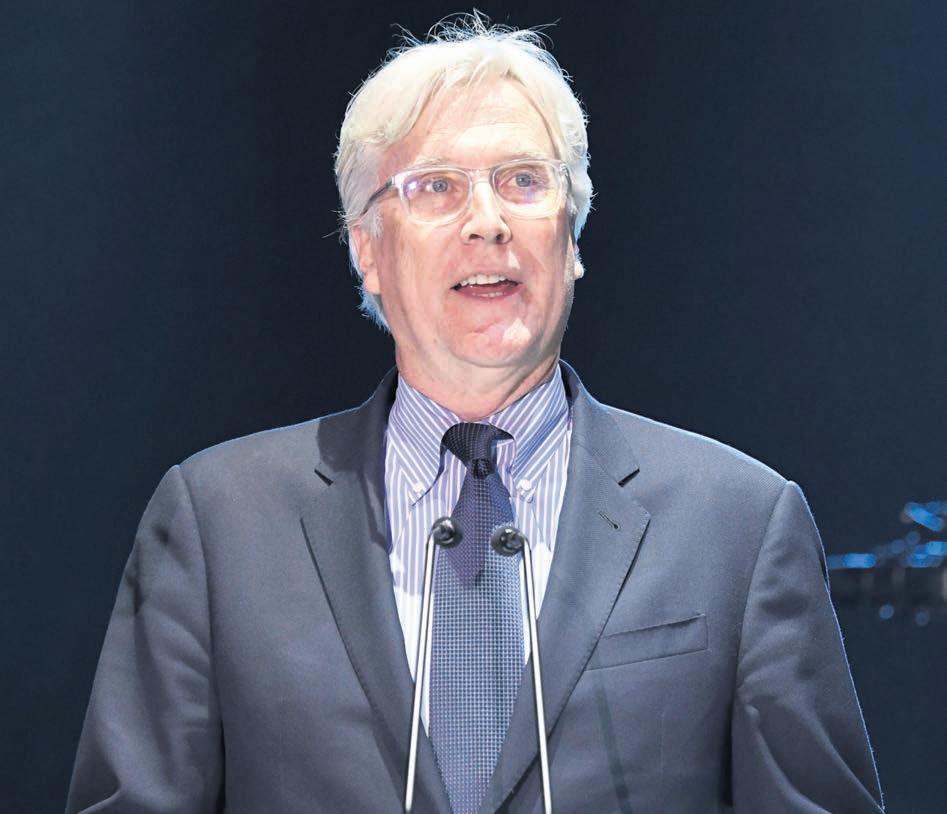
Walter is a long-time business partner of Chelsea chairman Todd Boehly at US investment company Guggenheim Partners, where he is chief executive. He and Boehly have also been co-owners of baseball’s Los Angeles Dodgers since 2012.
Some at the ITF fear the deal is effectively a fait accompli but insist there should be greater scrutiny of the proposals to partner with Walter than they say was afforded to member nations before the Kosmos agreement. They have called for any new investors to provide financial guarantees. They also allege that Switzerland has already been promised that it will host the 2023 final of the Billie Jean King Cup without a tender process.
The ITF said: “There is no joint venture in place around the Billie Jean King Cup and the process to determine the host of the 2023 finals is ongoing with a number of cities involved. A decision is likely to be made in February subject to board approval.” City A.M. attempted to contact Walter for comment but did not receive a reply.
MARK WALTER: WHO IS HE AND WHAT DOES HE OWN?
MARK Walter is a 63-year-old American businessman who is chief executive of financial services firm Guggenheim Partners and a keen player in the world of sports team acquisitions.
Walter, from Cedar Rapids in Iowa, may be best known to British sports fans due to his recent part-acquisition of a Premier League football club.
He was part of the Todd Boehly-fronted consortium who successfully bid £2.5bn to buy Chelsea Football Club from Roman Abramovich in May 2022.
But Walter’s investments in sport go way beyond the top flight of English football, most famously as a part-owner of Major
Spurs dip toe into transfer market as Cherries duo top up squad
MATT HARDYTOTTENHAM Hotspur last night confirmed the signing of the Netherlands international Arnaut Danjuma on loan from Spanish club Villarreal.
The 25-year-old forward will head to north London for the remainder of the season and boosts Antonio Conte’s options in attack.
The Dutchman joined Villarreal from Bournemouth in 2021 but has made just 33 appearances for the LaLiga side, who are fifth in the Spanish top division.
Elsewhere, Bournemouth have confirmed a move for goalkeeper
Darren Randolph from West Ham United on a permanent deal.
Randolph had played just 10 times for the Hammers since joining the London club from Middlesbrough three years ago.
The Cherries have also signed Roma defender Matias Vina on loan for the remainder of the 2022-23 season.
The 25-year-old left-back has made 29 appearances for Jose Mourinho’s men since joining the Serie A side from Palmeiras in 2021.
Vina was part of Uruguay’s World Cup squad last year and will bolster Bournemouth’s fight to stay in the Premier League.

League Baseball franchise the Los Angeles Dodgers, alongside Boehly.
Moreover, Walter has been part-owner of the Women’s NBA side the Los Angeles Sparks since 2014.
Forbes estimates Walter’s individual worth to be around $5.3bn (£4.3bn), while Guggenheim Partners claims that it manages more than $280bn (£227bn) of assets in total.
He also has long-standing links to Billie Jean King, who has lent her name to the women’s team tennis competition that he is in talks to partner with. Former tennis star King and her partner Ilana Kloss joined his Dodgers ownership group in 2018.
King is also reportedly involved in ongoing plans to establish a women’s ice hockey league in North America alongside Walters and a further group of individuals.
In addition, Walters is said to be one of the financial backers of North American motor racing team Andretti’s ongoing bid to join Formula 1 in 2026. One of Andretti’s main sponsors, Gainbridge, replaced BNP Paribas as the title sponsor of the Billie Jean King Cup last year.
The billionaire has fingers in lots of pies and, should his venture into tennis prove successful, he could be adding another notable asset to his sporting portfolio.
MATT HARDYWomen’s IPL winning bids total over £450m in value
group are, however, currently facing a share slide after US firm Hindenburg shorted their shares.
The
The inaugural Women’s IPL comes 15 years after the first men’s series – the brand is one of the most recognisable domestic leagues in world sport.
The most forked out for one of the five teams was by the Adani Group, who paid around £129m (1289 Crore) for their Ahmedabad franchise. The
Mumbai Indians – who own the men’s IPL franchise as well as SA20 side Cape Town – grabbed the second highest valued franchise for £90m.
Royal Challengers Bangalore have a team worth £89.7m, steel group JSW have one worth £80.6m and Capari – a loaner – took the final team at £75.3m.
The combined £444m valuation for the combined teams puts the Women’s IPL at a higher valuation than England’s The Hundred – which has reportedly been valued at £400m by private investors who were looking into a stake in the league.
